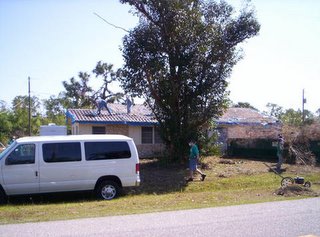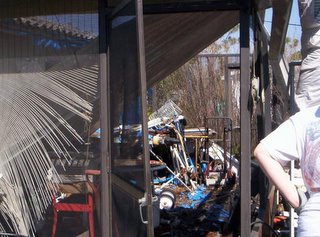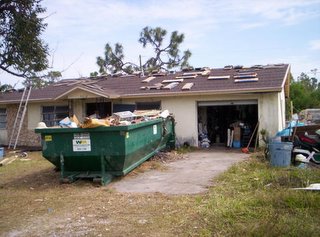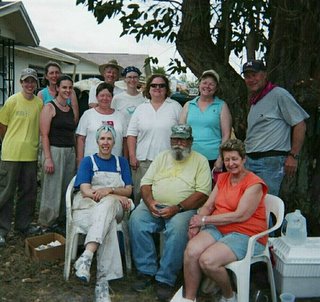Coming in From the Cold
Scripture: Luke 15:11-32
I was in warm, sunny Florida last week. In fact, just last Saturday I was in short sleeves, driving with the A/C on, and going to a tour of a working cattle ranch. The crescent-B happens to have cypress swamps, saw-palmettos, and alligators, along with its herd of cracker-cattle. They're historic cows, descended from the cattle of early Spanish settlers.
But before a nice weekend spent hitting the tourists spots, I spent a week in the sun working on a house damaged by Hurricane Charley. Hurricane Charley was a year and a half ago, and the fellow whose house we worked on--Dave--had been living in a FEMA trailer while the roof had big holes in it. There were remains of a blue roof--a tarp nailed over the top as a temporary measure--but it had mostly blown away. So we started working on his roof.

It was warm. It was very warm, in fact, especially on the roof. Coming back north to Baltimore this week has been a stark reminder of how warm it really was down there.
Have you ever misjudged how cold it was going to be and left the house without that extra jacket or sweater or long underwear? This happens to me fairly often--I get cold easily. I'll leave the house thinking, "Oh, it'll be all right," and then have my doubts as I walk down the steps, but I think "well, it's too late to turn around now...." and of course after that I'll have to stand outside shivering and wishing I'd just grabbed the sweatshirt on the way out the door--wishing I'd thought ahead a little before I left home.
I think the younger son in today's Bible story finds himself in a similar, although much more serious, situation. He left home thinking that he had everything he needed. His half of the inheritance was, after all, a good chunk of money. But by taking the property and selling it, he was acting as if his father were already dead--a hurtful, awful thing to communicate. He severed his ties with his family, leaving behind a broken relationship, a burnt bridge. But he takes the money and thinks it will be enough. It's not.
In fact, the money goes pretty fast. And just as the younger, wayward son is coming to the end of it, a famine settles on the land. And that wayward child starts feeling very cold. The only job he can get is a pure humiliation--feeding pigs--and it doesn't even pay him enough to get some food. He settles into a shivering, hungry existence, with no family and no means of his own.
Before we ever got to Dave's house to work on it, before he ever agreed to let a crowd of strangers descend on his house, Dave was living in the cold in a different way. Here was, almost 70 and with health problems, saddled with an unlivable house and no insurance money to fix it up. When Chuck from the interfaith organization came knocking on his door, though, Dave wasn't real sure he wanted any help. I don't know about you, but I don't like asking for help, even when I need it. For one thing, it usually means having to change.
I didn't mention this before, but Dave is one of those folks who likes to hold onto things. A lot of things.

For a long time. I know I have these tendencies myself when it comes to pieces of paper. I think, "I'll need this later," or "this is something I could use" and then the little pieces of paper kind of grow and multiply and build on each other. And then there are little piles, and then bigger piles, all around the house. Books seem to do the same thing for me, too. But Dave didn't have someone living with him to lovingly remind him to throw some of it out. So he had a house full of stuff when the hurricane hit. And the stuff got wet and a lot of it got moldy.
So I think when Dave agreed to accept a work crew at his house, he was probably hoping we could fix the roof and let the insides alone. But that's not how it worked.

Along with the roof team, Dave also got a kitchen crew--4 or 5 mothers with strong stomachs and a sense of order. They started in the kitchen, shoveling out old newspapers and mystery food jars, and by the end of the week, Carol was helping Dave go through old pictures and throw out costume jewelry.
And I'm sure it was hard for Dave to let go of each thing, even if a lot of it was ruined. Don't you have a few moldy things of your own that have been kicking around in a closet somewhere? Things you'd like to hold onto, even though you know they're really not doing anybody any good? Maybe some old anger and resentment? a paralyzing burden of guilt? Greed or arrogance? or some of those ugly fears that keep you comfortably rooted in place?

The problem is, getting help sometimes means changes that we aren't always ready to make. But for the younger son in our story, when he realizes what his options really are, he decides that the change his worth it. His situation is, after all, pretty desperate. He knows he's lost the right to be called a son, he feels his pride crushed having to crawl back to his father. And his father has every right to say no. But the son is hoping for just a little mercy--to be a servant with enough to eat and a roof over his head. No honors, no special treatment. He's ready to give it all up, to make a change. He's ready to come in from the cold.
What happens when he gets home is totally unexpected. His father does not stand on ceremony. There are no cold silences, demands for an explanation or cutting words. The father runs, totally undignified, totally joyful, runs to the younger son. "Father," the younger son starts to confess, "I've sinned against heaven and before you." But that's about all he can get out before his father starts shouting instructions--get the robe, get the ring, get the barbeque started. It's time to party!
Not only is the younger son welcomed home, not only does he come in from the cold, but the one who rejected his father is welcomed as a son, a much-beloved, long-desired child. This is how God is with us. God loves us and longs to welcome us home, to welcome us in from the cold, to bless us and enjoy us.

For Dave I think coming in from the cold was slower, and maybe isn't done quite yet. When I first met him he was quiet, and mostly worried about whether we were going to throw away the rusty tools on his back porch. But as the week wore on, we warmed up to us--started telling us stories--about the hurricane, about his life--and I think that we encouraged each other. I saw the hands of God that week in those half-dozen professional and not-so-professional roofers, in the determined cleaners, and heck, even in the garbage guys who had to be specially requested to take away a pile of black bags and old furniture. My favorite moment, though, was when, after the back yard was cleared Dave went out on his riding lawnmower. I will never forget those joyful, spinning figure-eights. Sure he was just going over the work. Sure.

In all those moments of grace, God was there, laughing and joyful, inviting all of us back home. And we were coming in from the cold together.
________________________________________________________________
The epilogue is this: There are still people left out in the cold. Some are like the younger brother. They're afraid they've strayed too far, that there won't be a welcome for them. But some are like that stubborn older brother. They just want what's fair, and they don't think it's right to be so extravagant, so welcoming. And we don't know from the story if the older brother comes in from the cold or not. It's up to us to decide. But I'll say this: if he stays out, he's going to miss a great party. So what's it going to be? Where are you standing now? And are you ready to come in from the cold?
I was in warm, sunny Florida last week. In fact, just last Saturday I was in short sleeves, driving with the A/C on, and going to a tour of a working cattle ranch. The crescent-B happens to have cypress swamps, saw-palmettos, and alligators, along with its herd of cracker-cattle. They're historic cows, descended from the cattle of early Spanish settlers.
But before a nice weekend spent hitting the tourists spots, I spent a week in the sun working on a house damaged by Hurricane Charley. Hurricane Charley was a year and a half ago, and the fellow whose house we worked on--Dave--had been living in a FEMA trailer while the roof had big holes in it. There were remains of a blue roof--a tarp nailed over the top as a temporary measure--but it had mostly blown away. So we started working on his roof.

It was warm. It was very warm, in fact, especially on the roof. Coming back north to Baltimore this week has been a stark reminder of how warm it really was down there.
Have you ever misjudged how cold it was going to be and left the house without that extra jacket or sweater or long underwear? This happens to me fairly often--I get cold easily. I'll leave the house thinking, "Oh, it'll be all right," and then have my doubts as I walk down the steps, but I think "well, it's too late to turn around now...." and of course after that I'll have to stand outside shivering and wishing I'd just grabbed the sweatshirt on the way out the door--wishing I'd thought ahead a little before I left home.
I think the younger son in today's Bible story finds himself in a similar, although much more serious, situation. He left home thinking that he had everything he needed. His half of the inheritance was, after all, a good chunk of money. But by taking the property and selling it, he was acting as if his father were already dead--a hurtful, awful thing to communicate. He severed his ties with his family, leaving behind a broken relationship, a burnt bridge. But he takes the money and thinks it will be enough. It's not.
In fact, the money goes pretty fast. And just as the younger, wayward son is coming to the end of it, a famine settles on the land. And that wayward child starts feeling very cold. The only job he can get is a pure humiliation--feeding pigs--and it doesn't even pay him enough to get some food. He settles into a shivering, hungry existence, with no family and no means of his own.
Before we ever got to Dave's house to work on it, before he ever agreed to let a crowd of strangers descend on his house, Dave was living in the cold in a different way. Here was, almost 70 and with health problems, saddled with an unlivable house and no insurance money to fix it up. When Chuck from the interfaith organization came knocking on his door, though, Dave wasn't real sure he wanted any help. I don't know about you, but I don't like asking for help, even when I need it. For one thing, it usually means having to change.
I didn't mention this before, but Dave is one of those folks who likes to hold onto things. A lot of things.

For a long time. I know I have these tendencies myself when it comes to pieces of paper. I think, "I'll need this later," or "this is something I could use" and then the little pieces of paper kind of grow and multiply and build on each other. And then there are little piles, and then bigger piles, all around the house. Books seem to do the same thing for me, too. But Dave didn't have someone living with him to lovingly remind him to throw some of it out. So he had a house full of stuff when the hurricane hit. And the stuff got wet and a lot of it got moldy.
So I think when Dave agreed to accept a work crew at his house, he was probably hoping we could fix the roof and let the insides alone. But that's not how it worked.

Along with the roof team, Dave also got a kitchen crew--4 or 5 mothers with strong stomachs and a sense of order. They started in the kitchen, shoveling out old newspapers and mystery food jars, and by the end of the week, Carol was helping Dave go through old pictures and throw out costume jewelry.
And I'm sure it was hard for Dave to let go of each thing, even if a lot of it was ruined. Don't you have a few moldy things of your own that have been kicking around in a closet somewhere? Things you'd like to hold onto, even though you know they're really not doing anybody any good? Maybe some old anger and resentment? a paralyzing burden of guilt? Greed or arrogance? or some of those ugly fears that keep you comfortably rooted in place?

The problem is, getting help sometimes means changes that we aren't always ready to make. But for the younger son in our story, when he realizes what his options really are, he decides that the change his worth it. His situation is, after all, pretty desperate. He knows he's lost the right to be called a son, he feels his pride crushed having to crawl back to his father. And his father has every right to say no. But the son is hoping for just a little mercy--to be a servant with enough to eat and a roof over his head. No honors, no special treatment. He's ready to give it all up, to make a change. He's ready to come in from the cold.
What happens when he gets home is totally unexpected. His father does not stand on ceremony. There are no cold silences, demands for an explanation or cutting words. The father runs, totally undignified, totally joyful, runs to the younger son. "Father," the younger son starts to confess, "I've sinned against heaven and before you." But that's about all he can get out before his father starts shouting instructions--get the robe, get the ring, get the barbeque started. It's time to party!
Not only is the younger son welcomed home, not only does he come in from the cold, but the one who rejected his father is welcomed as a son, a much-beloved, long-desired child. This is how God is with us. God loves us and longs to welcome us home, to welcome us in from the cold, to bless us and enjoy us.

For Dave I think coming in from the cold was slower, and maybe isn't done quite yet. When I first met him he was quiet, and mostly worried about whether we were going to throw away the rusty tools on his back porch. But as the week wore on, we warmed up to us--started telling us stories--about the hurricane, about his life--and I think that we encouraged each other. I saw the hands of God that week in those half-dozen professional and not-so-professional roofers, in the determined cleaners, and heck, even in the garbage guys who had to be specially requested to take away a pile of black bags and old furniture. My favorite moment, though, was when, after the back yard was cleared Dave went out on his riding lawnmower. I will never forget those joyful, spinning figure-eights. Sure he was just going over the work. Sure.

In all those moments of grace, God was there, laughing and joyful, inviting all of us back home. And we were coming in from the cold together.
________________________________________________________________
The epilogue is this: There are still people left out in the cold. Some are like the younger brother. They're afraid they've strayed too far, that there won't be a welcome for them. But some are like that stubborn older brother. They just want what's fair, and they don't think it's right to be so extravagant, so welcoming. And we don't know from the story if the older brother comes in from the cold or not. It's up to us to decide. But I'll say this: if he stays out, he's going to miss a great party. So what's it going to be? Where are you standing now? And are you ready to come in from the cold?

0 Comments:
Post a Comment
<< Home